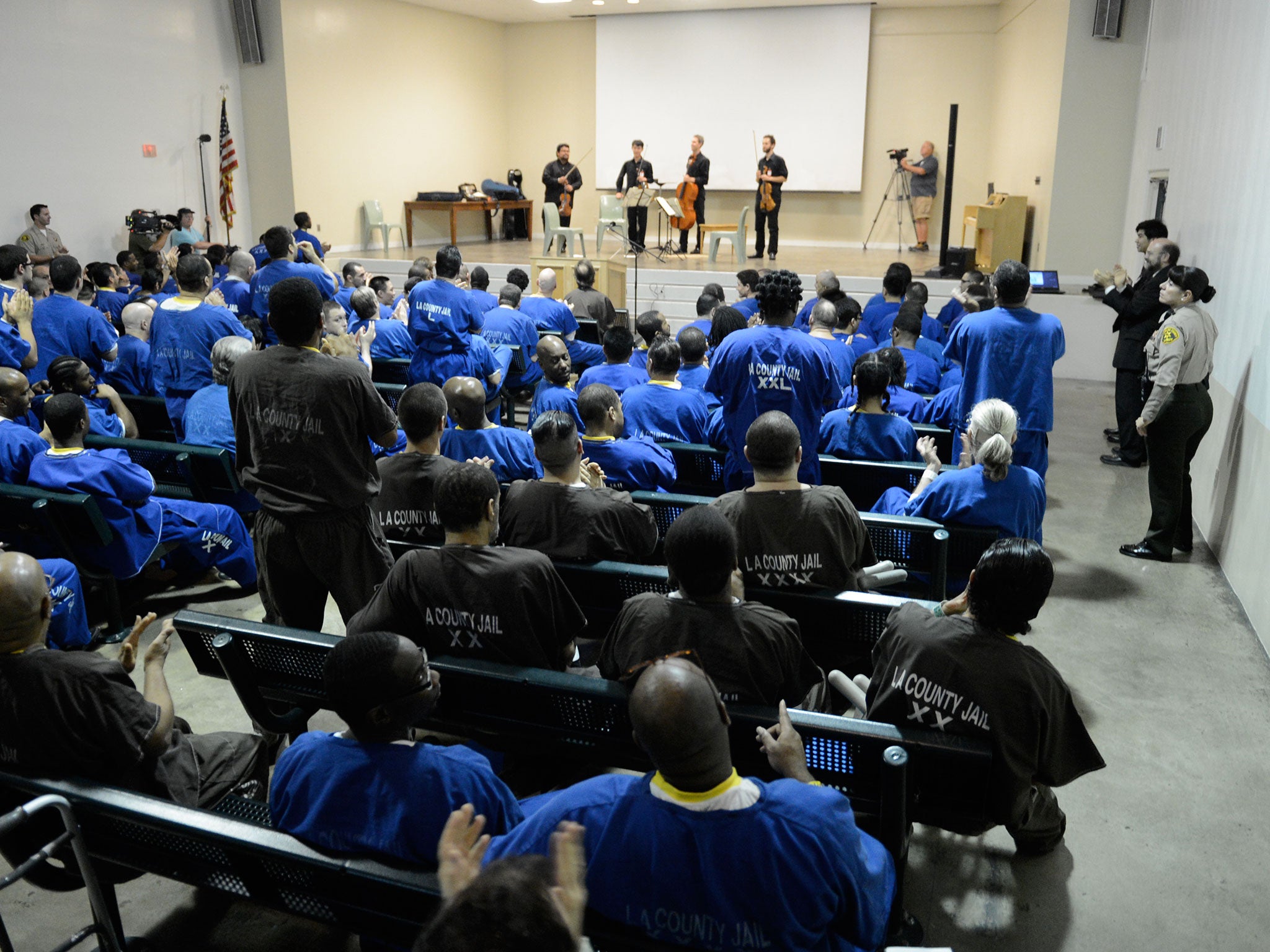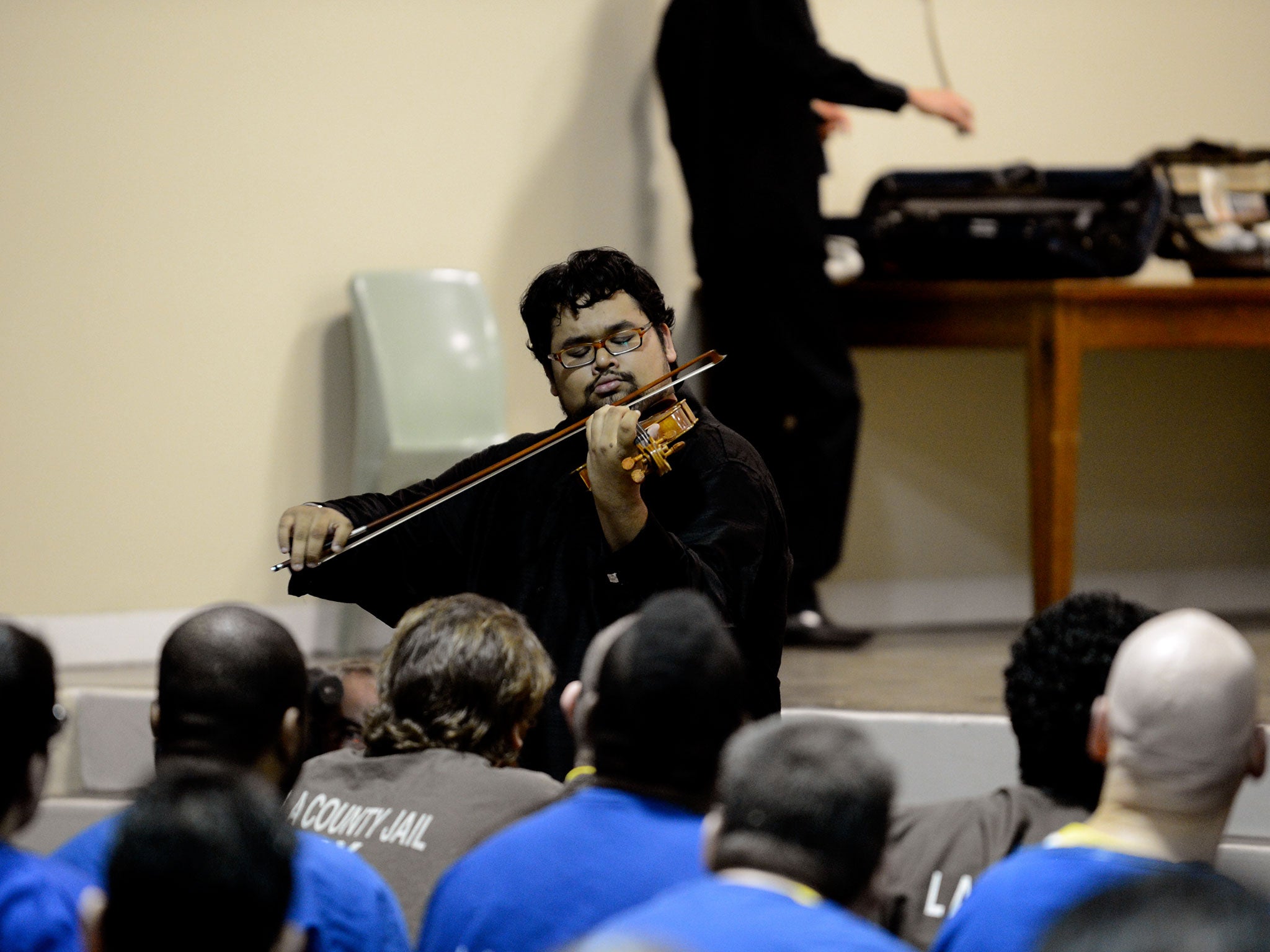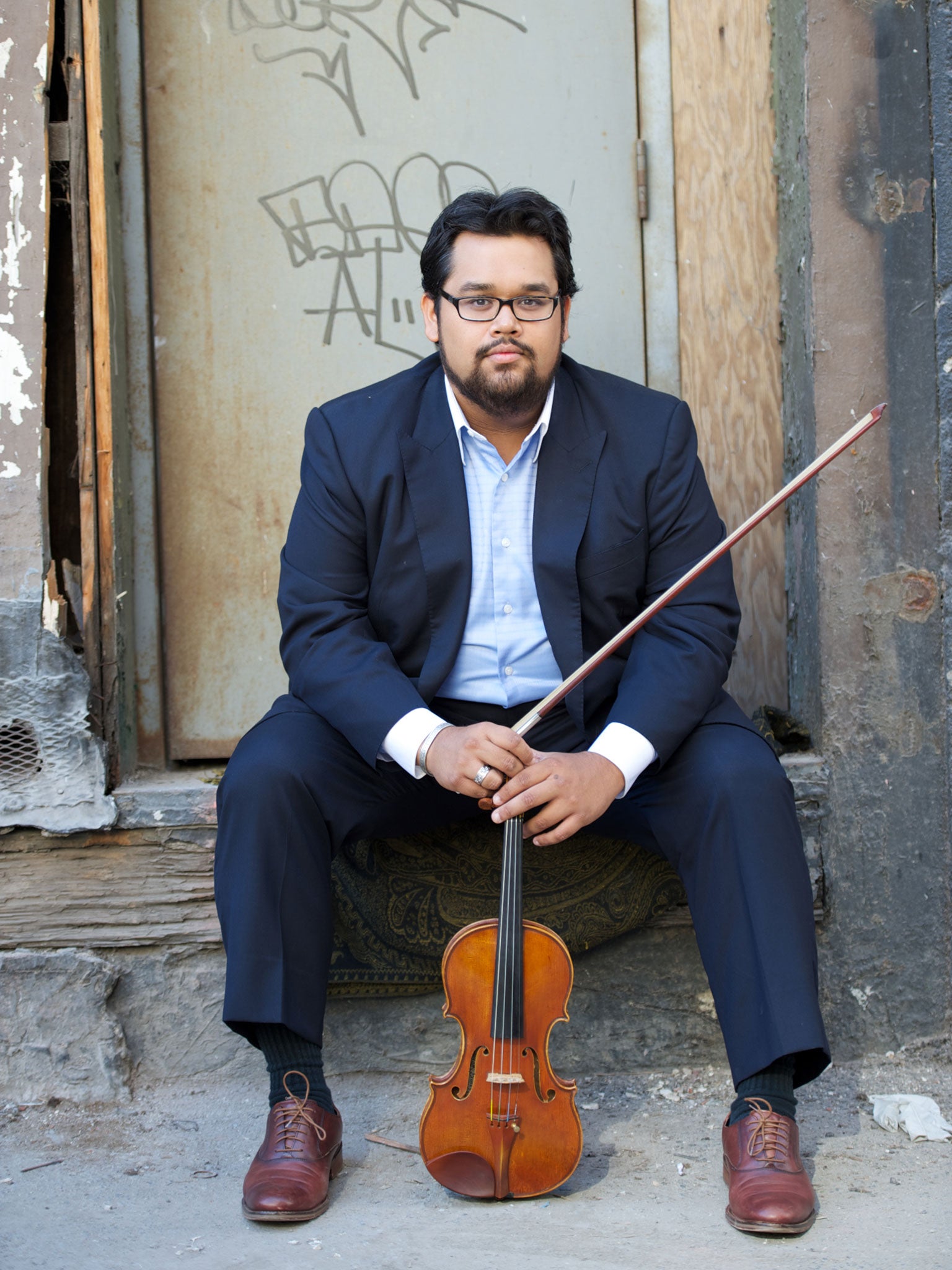Top violinist taking classical music behind bars and to the streets
Organisation founded by acclaimed soloist is breaking down barriers

About 150 audience members are listening rapt as Vijay Gupta, acclaimed violinist for the Los Angeles Philharmonic, and his colleague Zach Dellinger play a movement by Mozart for the violin and viola. Some of those watching nod their heads or tap their feet, others close their eyes, the better to appreciate the sprightly interplay of the two instruments.
Unlike Gupta’s regular audience at the Walt Disney Concert Hall in Downtown LA, some of whom will pay more than $250 (£146) for a ticket, today’s crowd are hearing him play for free. But the assembled men in blue jumpsuits are not, themselves, free. They are all low-level offenders serving out custodial sentences at the Pitchess Detention Centre, around half an hour north of LA.
This is the 50th such gig that Gupta, 26, has played at an LA County jail for Street Symphony, the non-profit organisation that he co-founded to bring live classical music to the imprisoned, the mentally ill, the homeless and other disadvantaged and disenfranchised members of Southern California society: “To places,” he says, “where no one like us ever dared to go before.”
The Disney Hall is located just a few blocks from the borders of Skid Row, a neighbourhood in the heart of America’s second city which contains the largest concentration of homeless people in the US. It was that physical proximity, and that spiritual disparity, which inspired Gupta to set up Street Symphony in 2011. The organisation now consists of Gupta’s string quartet and four other ensembles, including a jazz group, all of whom play regular Street Symphony shows.

“At first we thought we were bringing music to people who would never have access to Disney Hall,” Gupta says. “But later we realised that it was working on us as well, because these were people that we didn’t have access to either – because we choose not to. Street Symphony doesn’t have a religious mission or a political agenda, it’s just about us showing up and saying, ‘We’re paying attention to what’s going on here, and maybe you should, too.’”
Gupta was born in 1987 and grew up just outside New York. Encouraged by his Indian immigrant parents, he took up the violin at the age of four, and by seven had been admitted to a weekly, pre-college training programme at the prestigious Juilliard conservatory in Manhattan. His father was so proud of his young son’s prowess that he flew him to Tel Aviv to play for Zubin Mehta, the director for life of the Israel Philharmonic, who was sufficiently impressed that he invited Gupta to spend a season playing with the orchestra when he was just 11.
However, when his musical achievements began to interfere with his academic work, Gupta’s parents pushed him to pursue a career in medicine instead, telling him – to his dismay – that the violin must remain a hobby. Gupta was also a talented scientist, and graduated from college with a pre-med biology degree before he turned 18. But the following year, while studying Parkinson’s Disease as an intern in a Harvard medical lab, he met Gottfried Schlaug: a leading neuroscientist who was also a trained organist.

Schlaug had used his musical background to develop a technique known as melodic intonation therapy, which helps patients with major brain injuries to regain their speech through singing. The technique was recently used in the rehabilitation of Congresswoman Gaby Giffords, who was shot in an attack in Tucson in 2011. Of Schlaug, Gupta says: “Here was a guy who had made the same decision as me: to give up music to go into science. And he told me that I couldn’t do it.”
Emboldened, Gupta returned to the violin, and by 19 had an audition for the LA Phil, winning the position in 2007 ahead of hundreds of other applicants. Even seven years later, he remains the youngest performer in the orchestra. Shortly after his arrival, he was interviewed by the Los Angeles Times columnist Steve Lopez, who introduced him to another of his subjects. Nathaniel Ayers, himself a former Juilliard student, was a gifted double bassist who suffered from schizophrenia and lived destitute on the streets of Skid Row. Lopez had turned Ayers’ story into a book, which later became the film The Soloist.
Enjoy unlimited access to 100 million ad-free songs and podcasts with Amazon Music
Sign up now for a 30-day free trial. Terms apply.
ADVERTISEMENT. If you sign up to this service we will earn commission. This revenue helps to fund journalism across The Independent.
Enjoy unlimited access to 100 million ad-free songs and podcasts with Amazon Music
Sign up now for a 30-day free trial. Terms apply.
ADVERTISEMENT. If you sign up to this service we will earn commission. This revenue helps to fund journalism across The Independent.

“Steve introduced me to Nathaniel, and Nathaniel asked me for a violin lesson. So he started coming to Disney Hall for lessons,” Gupta recalls. “But soon I asked whether I could visit him, at the LA Men’s Project in the middle of Skid Row… The connection I had with Nathaniel felt more real to me outside the protection of the concert hall, in this trash-littered courtyard with the discarded crack pipes and an audience forming on the other side of the barbed wire fence. The idea of bringing beauty into that desolate, dehumanised place became a calling.”
Before long, Gupta was playing the first of what would later become Street Symphony concerts, in the basement of Skid Row’s Department of Mental Health facility. At Pitchess, he and Dellinger round off their recital with a version of Handel’s Passacaglia for violin and viola. As the piece comes to an end, they receive the same response as they would at Disney Hall: thunderous applause, and a standing ovation. After another such concert at a county jail, one inmate told Gupta: “You did for us what the bail bondsman and the judge couldn’t do: you got us out of here.”
Join our commenting forum
Join thought-provoking conversations, follow other Independent readers and see their replies
Comments
Bookmark popover
Removed from bookmarks